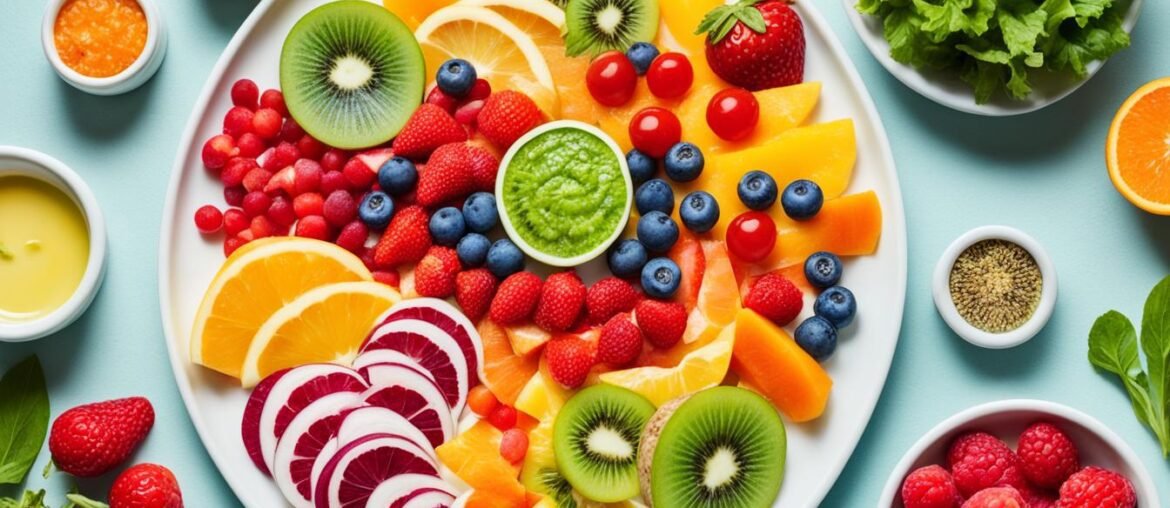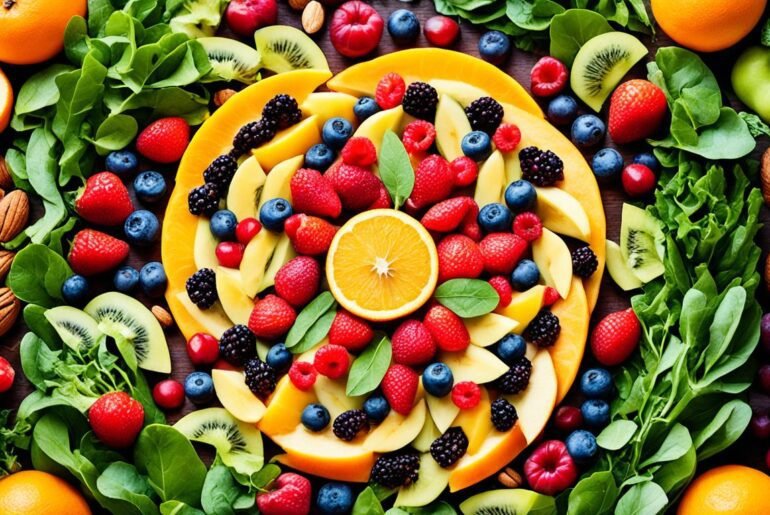Did you know that the foods you eat can have a significant impact on the health and appearance of your skin as you age? A proper diet can not only promote overall fitness and well-being but also help slow down the signs of aging, especially when it comes to your skin. By incorporating specific nutrient-dense foods into your diet, you can support healthy aging and rejuvenate your skin naturally.
As we age, our bodies rely on various nutrients to support the natural aging process. Some nutrients, such as antioxidants, healthy fats, and proteins, play a crucial role in promoting youthful skin and combating the effects of aging. By adding these skin-friendly foods to your diet, you can nourish your body from within and enhance the quality of your skin.
In this article, we will explore the best diet for youthful skin and discover the nutritious foods that support healthy aging. From extra virgin olive oil to dark chocolate and vegetables, we will uncover the power of these foods in promoting a younger-looking, radiant complexion.
Key Takeaways:
- Incorporating nutrient-dense foods into your diet can support healthy aging and promote youthful skin.
- Antioxidants, healthy fats, and proteins are essential for maintaining the health and appearance of your skin as you get older.
- Extra virgin olive oil, green tea, fatty fish, dark chocolate, vegetables, and other foods have specific properties that benefit your skin.
- Remember to combine a skin-friendly diet with other skincare practices and a healthy lifestyle for optimal results.
- By nourishing your body with the right foods, you can rejuvenate your skin and maintain a youthful glow.
Extra Virgin Olive Oil
Extra virgin olive oil is one of the healthiest oils on earth. It is rich in healthy fats and antioxidants that help reduce inflammation and oxidative damage caused by an imbalance of free radicals in the body. A diet rich in olive oil has been linked to a lower risk of chronic diseases such as heart disease, type 2 diabetes, metabolic syndrome, and certain types of cancer.
The monounsaturated fats (MUFAs) in olive oil have been shown to have anti-inflammatory effects and may help reduce skin aging. The antioxidants found in olive oil, such as tocopherols and beta carotene, also have anti-inflammatory properties.
Choosing cold-pressed extra virgin olive oil is ideal because it is higher in antioxidants and less processed than other oils. It is important to note that the health benefits of olive oil come from consuming it in its natural, unheated state, such as in salad dressings or drizzled over cooked foods.
Green Tea
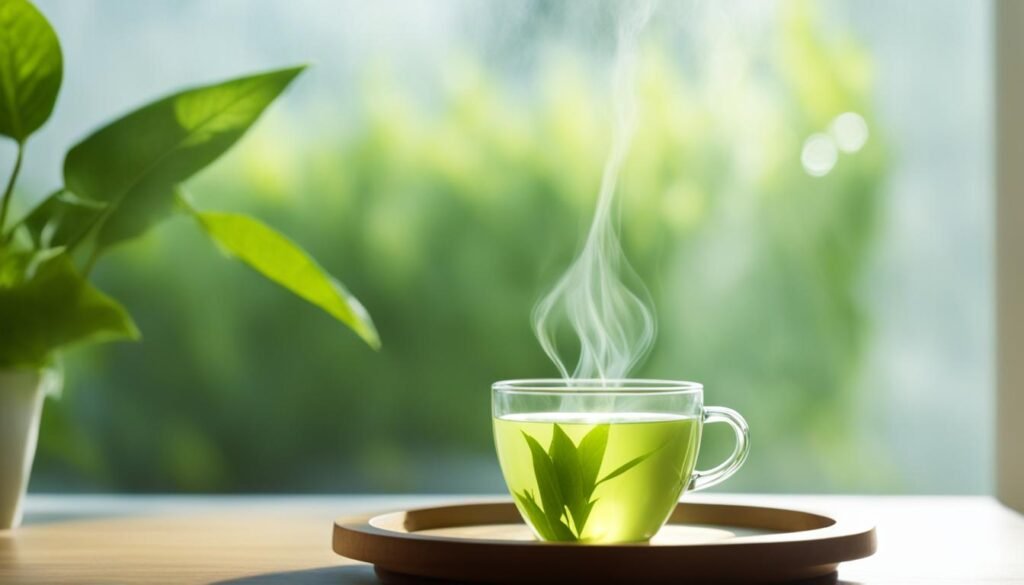
Green tea is a delicious and refreshing beverage that offers numerous health benefits, especially for our skin. It is rich in antioxidants, particularly polyphenols like epigallocatechin gallate (EGCG), catechins, and gallic acid. These powerful antioxidants have been extensively studied for their potential positive effects on overall health and well-being.
Research suggests that the antioxidants present in green tea can help reduce the risk of various chronic diseases, including heart disease and neurological decline. Additionally, the polyphenols in green tea may contribute to the prevention of premature aging and skin damage.
One remarkable property of green tea polyphenols is their ability to scavenge free radicals in the body, protecting our cells from oxidative stress. Free radicals are unstable molecules that can damage our skin cells and accelerate the aging process. By neutralizing these free radicals, green tea may help prevent or minimize the visible signs of aging, such as wrinkles, fine lines, and age spots.
Moreover, green tea polyphenols have been found to exhibit anti-inflammatory properties. Inflammation is a natural immune response, but chronic inflammation can contribute to various skin conditions and accelerate skin aging. By reducing inflammation, green tea may help maintain a more youthful and vibrant complexion.
Another exciting potential benefit of green tea is its ability to protect the skin from sun damage. Exposure to ultraviolet (UV) rays from the sun is a significant contributor to skin aging and the development of skin cancer. The polyphenols in green tea have been shown to mitigate the harmful effects of UV exposure by acting as a natural sunscreen and reducing inflammation in the skin.
It is important to note that while green tea shows promising results in supporting healthy skin, more research is needed to fully understand its mechanisms and potential. However, incorporating green tea into your daily routine can be a simple and enjoyable way to increase your antioxidant intake and promote skin health.
Drinking green tea can potentially provide multiple benefits for our skin, including antioxidant protection, anti-inflammatory effects, and defense against sun damage.
Fatty Fish
Fatty fish, such as salmon, are an excellent addition to a healthy diet and offer numerous benefits for promoting youthful, radiant skin. These types of fish are packed with essential nutrients that support overall skin health and combat signs of aging.
The high content of omega-3 fats in fatty fish, including docosahexaenoic acid (DHA) and eicosapentaenoic acid (EPA), is particularly beneficial for both heart health and skin health. Omega-3 fatty acids play a vital role in maintaining a healthy skin barrier, preventing moisture loss, and reducing inflammation that can lead to skin damage and premature aging.
Salmon, in particular, is rich in astaxanthin, a powerful carotenoid antioxidant that provides impressive benefits for the skin. Astaxanthin has been shown to improve skin elasticity, hydration, and texture, helping to minimize the appearance of fine lines and wrinkles.
Fatty fish are also an excellent source of high-quality protein, which is fundamental for the production of collagen and elastin in the skin. These structural proteins are responsible for maintaining skin firmness, elasticity, and overall youthfulness.
Furthermore, fatty fish, including salmon, are rich in selenium, a trace mineral that contributes to DNA synthesis and repair processes in the body. Selenium helps protect the skin from damage caused by UV light and environmental stressors, reducing the risk of skin cancer and other skin-related issues.
To incorporate more fatty fish into your diet, enjoy grilled or baked salmon, sardines, mackerel, or trout as part of your main meals. Aim to include fatty fish in your diet at least twice a week to reap the maximum benefits for your skin and overall health.
Including fatty fish in your diet provides a powerful combination of omega-3 fats, protein, astaxanthin, collagen-supporting nutrients, and selenium. By incorporating these nutrient-rich fish into your meals, you can nourish your skin from within and promote a youthful, radiant complexion.
Dark Chocolate or Cocoa
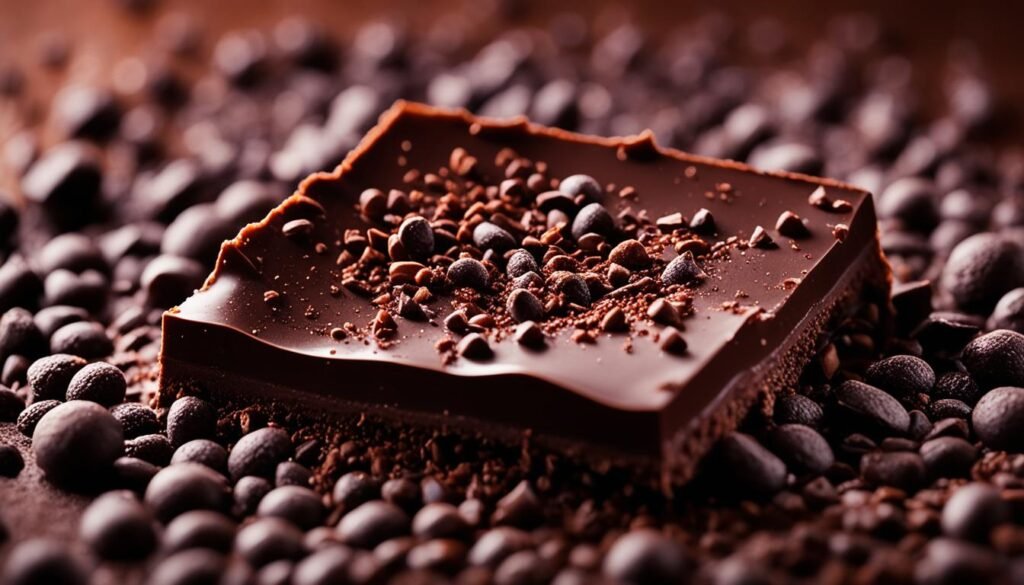
Indulging in the richness of dark chocolate not only satisfies your taste buds but also offers several benefits for your skin health. Dark chocolate is abundant in polyphenols, particularly flavanols, which act as powerful antioxidants in the body. These flavanols have been associated with a reduced risk of heart disease, type 2 diabetes, and cognitive decline.
Research suggests that dark chocolate may also help protect the skin from sun damage and slow down the aging process. Studies have shown that consuming cocoa rich in flavanols can improve skin elasticity and reduce the appearance of facial wrinkles. However, further research is still needed to fully comprehend the specific effects of dark chocolate on skin health.
When selecting dark chocolate, it is advisable to opt for varieties with a high cocoa content and minimal added sugar. This ensures that you receive the maximum benefits of antioxidants and flavanols without the excessive consumption of unhealthy ingredients. Incorporating a moderate amount of dark chocolate into your diet can be a delightful way to enhance your skin health.
| Benefits of Dark Chocolate: | Antioxidants | Flavanols | Skin Health |
|---|---|---|---|
| Promotes heart health | ✓ | ✓ | |
| Reduces risk of type 2 diabetes | ✓ | ✓ | |
| Enhances cognitive function | ✓ | ✓ | |
| Protects against sun damage | ✓ | ✓ | ✓ |
| Improves skin elasticity | ✓ | ✓ | ✓ |
| Reduces facial wrinkles | ✓ | ✓ | ✓ |
Vegetables
Most vegetables are nutrient-dense and low in calories, making them excellent choices for supporting healthy skin. Vegetables contain antioxidants that help reduce the risk of heart disease, cataracts, and certain cancers. Many vegetables are also high in carotenoids, such as beta carotene and lycopene, which can protect the skin against UV rays and prevent premature skin aging. Vitamin C, found in vegetables like leafy greens, bell peppers, tomatoes, and broccoli, is a potent antioxidant that plays a crucial role in collagen production. Eating a variety of vegetables of different colors can provide a range of antioxidants that benefit the skin and overall health.
| Vegetable | Antioxidant Content |
|---|---|
| Spinach | Rich in vitamins A and C, and contains lutein and zeaxanthin |
| Carrots | High in beta carotene |
| Tomatoes | Rich in lycopene |
| Kale | Packed with vitamins A, C, and K, and contains lutein and zeaxanthin |
| Bell Peppers | High in vitamin C |
| Broccoli | Rich in vitamins A and C, and contains sulforaphane |
Including a variety of vegetables in your diet can provide a wide range of antioxidants that promote healthy skin and overall well-being. Aim to incorporate leafy greens, colorful bell peppers, tomatoes, and cruciferous vegetables like broccoli into your meals. Eating vegetables raw or lightly cooked helps preserve their nutrient content. Consider adding salads, stir-fries, and smoothies to your meal plan to increase your vegetable intake.
Flax Seeds
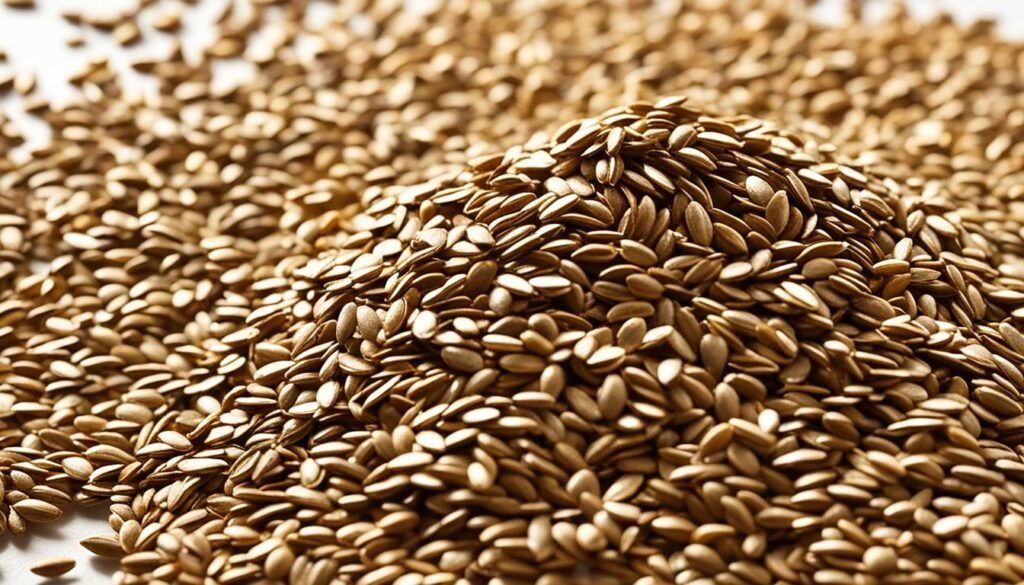
Flax seeds offer numerous health benefits, making them a valuable addition to your diet. These tiny seeds are packed with essential nutrients that support overall well-being, including healthy skin.
One notable benefit of flax seeds is their powerful antioxidant effects. Antioxidants are compounds that help protect the body’s cells from damage caused by free radicals. Flax seeds contain a variety of antioxidants that can help reduce oxidative stress and inflammation, which are key contributors to aging and chronic diseases.
One specific group of antioxidants found in flax seeds are called lignans. Lignans are phytochemicals that have been shown to have anti-cancer properties and may help reduce the risk of chronic diseases such as heart disease and breast cancer. These lignans also have potential benefits for the skin. They can help fight free radicals and promote a healthy skin membrane, thanks to their high content of alpha-linolenic acid (ALA), an omega-3 fatty acid.
Omega-3 fatty acids are essential for maintaining the integrity and health of the skin cell membrane. Research has shown that consuming flax seeds or flax oil can lead to increased skin hydration and smoothness, indicating improved skin health. The combination of flax seeds’ antioxidants, lignans, and omega-3 fatty acids makes them a valuable addition to any skin rejuvenation diet.
The Nutritional Profile of Flax Seeds:
| Nutrient | Amount per 100g |
|---|---|
| Calories | 534 |
| Carbohydrates | 28.88g |
| Fat | 42.16g |
| Protein | 18.29g |
| Omega-3 Fatty Acids | 22.8g |
| Fiber | 27.3g |
| Vitamin E | 0.3mg |
| Calcium | 255mg |
| Iron | 5.73mg |
| Zinc | 4.34mg |
Table: Nutritional profile of flax seeds per 100g.
These nutritional benefits, combined with the antioxidant compounds found in flax seeds, make them a valuable addition to a skin-friendly diet. Including flax seeds in your meals can help promote overall skin health and contribute to a youthful complexion.
Pomegranates
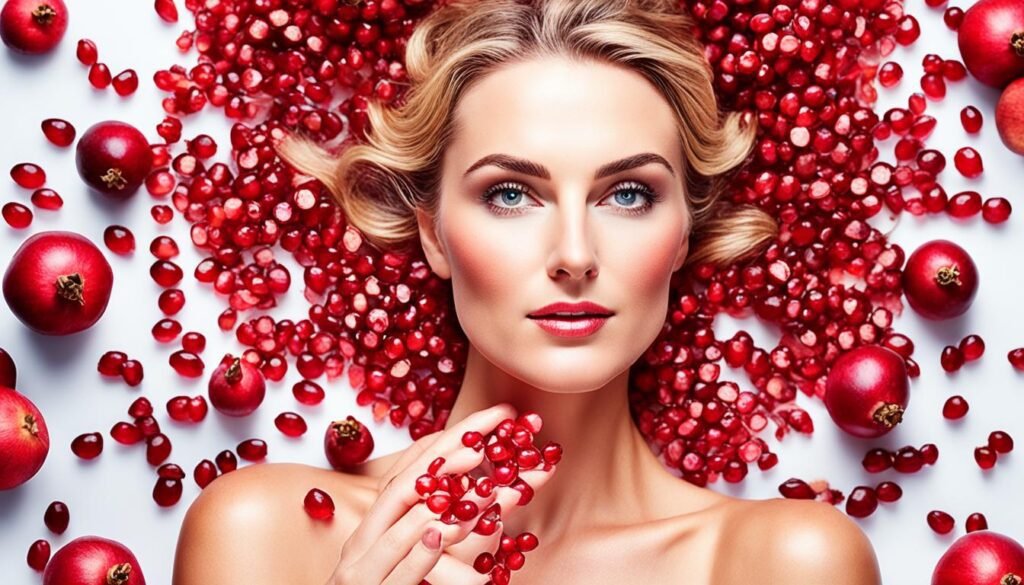
Incorporating pomegranates into your diet can provide numerous benefits for your skin. These vibrant fruits are not only delicious but also packed with antioxidants that promote skin health and repair. Pomegranates contain flavonols, tannins, phenolic acids, and lignans, all of which contribute to their potent antioxidant properties.
The antioxidants found in pomegranates help protect the skin from sun damage and counteract the harmful effects of free radicals. They have been shown to reduce the severity of UV skin damage, promoting skin repair and rejuvenation.
Moreover, pomegranates are rich in vitamin C, a vital nutrient for collagen synthesis. Collagen is a protein that supports skin structure, elasticity, and strength. By consuming pomegranates or their juice, you can provide your body with a nutritious source of antioxidants and support overall skin health.
Key Benefits of Pomegranates:
- Protection against sun damage
- Promotion of skin repair
- Stimulation of collagen synthesis
How to Enjoy Pomegranates:
Pomegranates can be enjoyed in a variety of ways. You can:
- Eat them fresh by scooping out the seeds
- Drink pomegranate juice
- Add pomegranate seeds to salads, yogurt, or smoothies
By incorporating pomegranates into your diet, you can reap the skin-loving benefits of these antioxidant-rich fruits.
Avocados
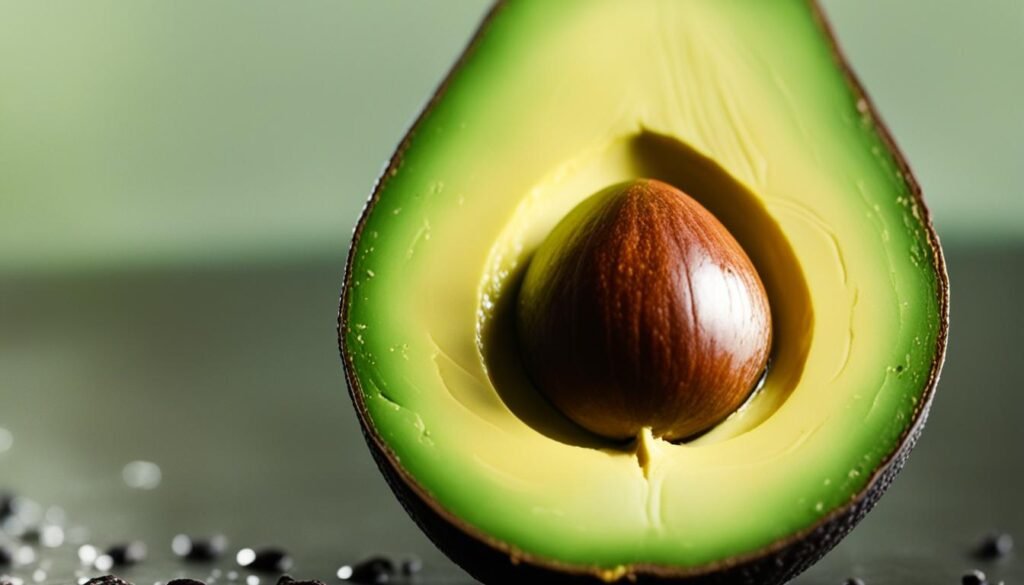
Avocados are an excellent addition to a skin-healthy diet. They are not only delicious but also packed with beneficial nutrients. Avocados are rich in heart-healthy monounsaturated fats, which help maintain skin moisture and protect against harmful UV rays. These healthy fats nourish the skin from within, promoting a radiant and youthful complexion.
But avocados offer more than just fats. They are also a great source of vitamins and minerals that support overall skin health. Avocados provide vitamins K, C, E, and A, which are essential for maintaining the skin’s elasticity and fighting against visible signs of aging. Vitamin C, in particular, is a powerful antioxidant that helps combat oxidative stress, a major contributor to skin aging.
In addition to vitamins, avocados are rich in minerals like potassium and magnesium. These minerals play a vital role in skin health, promoting hydration, reducing inflammation, and supporting the skin’s natural repair processes. Avocados also contain B vitamins, which contribute to the overall health and vitality of the skin.
There are many ways to enjoy avocados as part of your skincare routine. You can add sliced avocados to salads, blend them into smoothies, or simply spread them on whole grain toast. The versatility of avocados makes it easy to incorporate them into your meals and snacks, ensuring you reap the full benefits they offer for your skin.
Avocados are a delicious and nutritious choice for supporting healthy and youthful skin. Whether you enjoy them as a spread, a topping, or a main ingredient, avocados provide the essential nutrients your skin needs to thrive. Don’t forget to include this skin-loving fruit in your diet for a glowing complexion from the inside out.
Walnuts
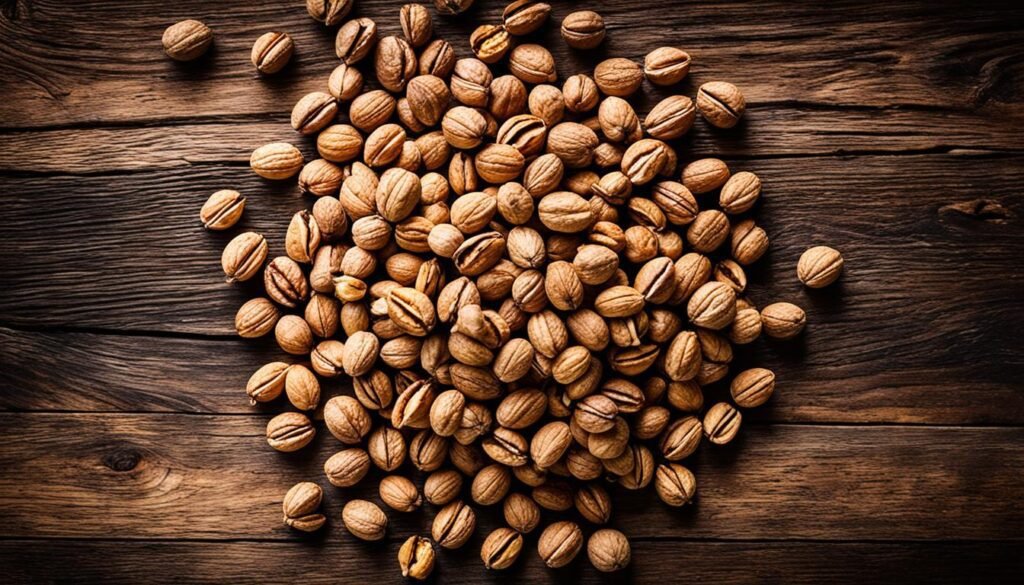
Walnuts are a powerhouse of nutrients that offer a host of benefits for skin health. Their rich composition of omega-3 fatty acids, polyphenols, and prebiotics make them an essential addition to any skin-friendly diet.
Omega-3 fatty acids play a crucial role in repairing skin tissue, promoting moisture retention, and protecting against harmful UV rays. By incorporating walnuts into your diet, you can nourish your skin from within, helping it stay healthy, resilient, and glowing.
Polyphenols are potent antioxidants that fight inflammation and combat free radicals, which are major contributors to skin aging. By consuming walnuts, you can harness the power of polyphenols to reduce oxidative stress and keep your skin looking youthful and vibrant.
Furthermore, walnuts contain prebiotics that support the growth of beneficial gut bacteria. A healthy gut microbiome is closely linked to skin health, as it helps maintain a balanced immune system and optimize nutrient absorption. By nurturing your gut with walnuts, you can promote optimal skin health from the inside out.
Fortunately, incorporating walnuts into your diet is easy and versatile. You can enjoy them as a snack on their own, add them to salads for an extra crunch, or include them in baked goods for a nutty twist. The possibilities are endless!
Nutritional Profile of Walnuts
| Nutrient | Amount per 100g |
|---|---|
| Calories | 654 |
| Protein | 15g |
| Fat | 65g |
| Carbohydrates | 14g |
| Fiber | 7g |
| Omega-3 Fatty Acids | 9g |
| Polyphenols | Varying amounts |
| Prebiotics | Varying amounts |
By including walnuts in your daily diet, you can reap the numerous benefits they offer for skin health. Their combination of omega-3 fatty acids, polyphenols, and prebiotics works synergistically to support healthy, radiant skin that defies the signs of aging.
Strawberries
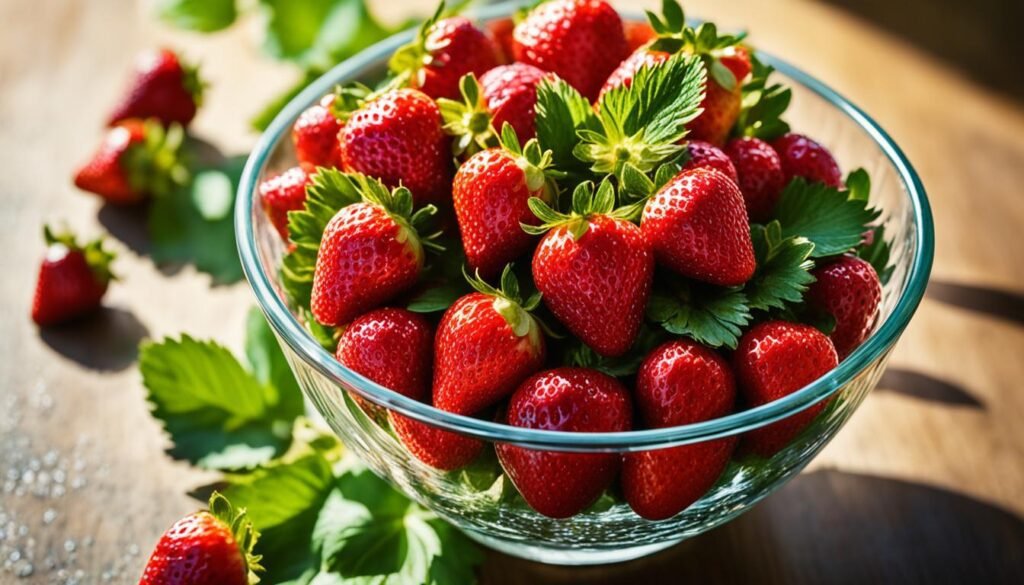
Strawberries are a delicious and nutritious addition to any diet. Not only are they packed with flavor, but they are also a great source of fiber, antioxidants, and vitamin C, all of which contribute to healthy skin and support skin repair.
The high levels of fiber in strawberries help promote healthy digestion and can contribute to overall skin health. Fiber aids in the removal of waste and toxins from the body, which can have a positive impact on the appearance of your skin.
Antioxidants are essential for protecting the skin against damage caused by free radicals. Strawberries are rich in antioxidants, such as phenolic compounds, including ellagic acid and flavonoids. These compounds have anti-inflammatory properties and can help repair skin damage caused by environmental factors, such as sun exposure.
Including strawberries in your diet is easy and versatile. They can be enjoyed on their own as a refreshing snack, added to smoothies for a burst of flavor, or mixed with yogurt for a nutritious and delicious breakfast option. The antioxidants and phenolic compounds in strawberries make them a valuable addition to any skincare routine, contributing to skin repair and overall skin health.
Incorporate strawberries into your diet to enjoy their many skin-supporting benefits. With their fiber content, antioxidants, and phenolic compounds, strawberries can help promote healthy, vibrant skin.
Conclusion
Nourishing your body with a diet rich in nutrient-dense foods is essential for healthy aging and maintaining youthful skin. Incorporating the following foods into your diet can support skin rejuvenation and contribute to a healthy aging diet:
- Extra Virgin Olive Oil: Rich in healthy fats and antioxidants, it helps reduce inflammation and promotes skin health.
- Green Tea: High in antioxidants, it protects against skin aging and sun damage.
- Fatty Fish: Omega-3 fats, protein, and antioxidants support a healthy skin barrier and collagen production.
- Dark Chocolate: Its polyphenols can improve skin elasticity and protect against skin aging.
- Vegetables: Antioxidants, carotenoids, and vitamin C found in vegetables promote skin health and collagen production.
- Flax Seeds: Rich in antioxidants and omega-3 fatty acids, they contribute to skin hydration and smoothness.
- Pomegranates: Antioxidants and vitamin C in pomegranates protect the skin from sun damage and stimulate collagen production.
- Avocados: Monounsaturated fats and essential vitamins support skin moisture and protect against UV rays.
- Walnuts: Omega-3 fatty acids, polyphenols, and prebiotics in walnuts promote skin health and combat inflammation.
- Strawberries: High in fiber, antioxidants, and vitamin C, they contribute to skin repair and overall skin health.
Remember, a healthy diet is just one aspect of maintaining youthful skin. Combine it with a comprehensive skincare routine and a healthy lifestyle for optimal results. By incorporating these skin-friendly foods into your daily meals, you can support healthy aging and rejuvenate your skin.
FAQ
What is the best diet for youthful skin?
The best diet for youthful skin includes nutrient-dense foods that promote healthy aging. This diet should consist of foods rich in antioxidants, healthy fats, and high-quality protein.
What role does extra virgin olive oil play in maintaining youthful skin?
Extra virgin olive oil is rich in healthy fats and antioxidants that reduce inflammation and oxidative damage. It contains monounsaturated fats that have anti-inflammatory effects and help reduce skin aging. The antioxidants in olive oil also possess anti-inflammatory properties.
How does green tea benefit the skin?
Green tea is high in antioxidants, particularly polyphenols, which protect against premature skin aging caused by free radicals and environmental stressors. The polyphenols in green tea scavenge free radicals and can help reduce external skin aging.
How do fatty fish support youthful skin?
Fatty fish, like salmon, contain omega-3 fatty acids that maintain a healthy skin barrier and reduce inflammation that damages the skin. Salmon also contains astaxanthin, an antioxidant that improves skin elasticity and hydration. Protein and selenium from fatty fish play a role in collagen synthesis and repair, preventing skin damage caused by UV light.
Can dark chocolate or cocoa improve the health of the skin?
Dark chocolate is rich in antioxidants, including flavanols, which protect against heart disease, diabetes, and cognitive decline. Some studies suggest that dark chocolate can improve skin elasticity and reduce facial wrinkles, but more research is needed to fully understand the effect on skin health.
How do vegetables contribute to youthful skin?
Vegetables are nutrient-dense and low in calories, making them excellent choices for supporting healthy skin. They contain antioxidants that reduce the risk of heart disease, cataracts, and certain cancers. Vegetables high in carotenoids protect the skin against UV rays, while vitamin C promotes collagen production and overall skin health.
What are the benefits of consuming flax seeds for the skin?
Flax seeds offer health benefits, including antioxidant effects and the ability to reduce the risk of chronic diseases. They are high in lignans that fight free radicals in the body and omega-3 fatty acids that support a healthy skin membrane. Flax seeds can increase skin hydration and smoothness.
How can pomegranates promote youthful skin?
Pomegranates are packed with antioxidants that protect the skin from sun damage and promote skin repair. Studies suggest that pomegranate antioxidants reduce UV skin damage severity and stimulate collagen production. Vitamin C in pomegranates is essential for collagen synthesis and overall skin health.
What are the benefits of avocados for the skin?
Avocados are rich in heart-healthy fats, fiber, vitamins, and minerals that support overall health. The monounsaturated fats in avocados maintain skin moisture and protect against UV rays. Avocados provide vitamins K, C, E, and A, which support skin health and promote a youthful complexion.
How do walnuts contribute to the health of the skin?
Walnuts are an excellent source of omega-3 fatty acids, polyphenols, and prebiotics. Omega-3 fatty acids repair skin tissue, retain moisture, and protect against UV rays. Polyphenols combat inflammation and free radicals that contribute to skin aging. Prebiotics in walnuts support the growth of healthy gut bacteria, which is linked to skin health.
How do strawberries support youthful skin?
Strawberries are delicious and packed with fiber, antioxidants, and high levels of vitamin C. These nutrients promote healthy skin and contribute to skin repair. Phenolic compounds in strawberries, such as ellagic acid and flavonoids, have anti-inflammatory properties and help repair skin damage.
Is a skin-friendly diet enough for maintaining youthful skin?
While a skin-friendly diet can contribute to maintaining youthful skin, it is essential to combine it with other skincare practices and a healthy lifestyle. Proper skincare routine, adequate hydration, sufficient sleep, and sun protection are also important for optimal skin health.

